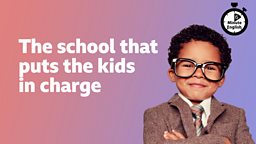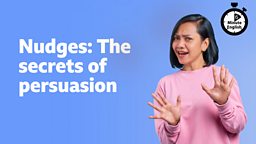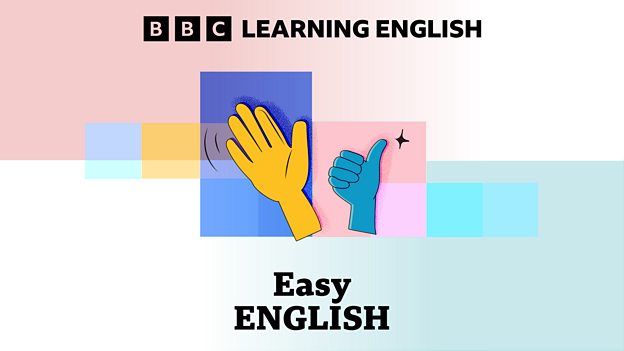6 Minute English
Intermediate level
Feed your brain
Episode 240222 / 22 Feb 2024

____________________________________________________________________________
Learn more about food
____________________________________________________________________________
Introduction
Our brain works very hard 24 hours a day. So, what food should we eat for maximum brain health? Phil and Georgie discuss this and teach you some useful vocabulary.
This week's question
Which mammal has the biggest brain? Is it:
a) an African elephant?
b) a dolphin? or,
c) a sperm whale?
Listen to the programme to hear the answer.
Vocabulary
sugar rush
suddenly feeling excited or full of energy after eating food containing a lot of sugar
balanced diet
a diet combining the proper types and amounts of food needed to stay healthy
go low
have very little of a particular thing
sharp
intelligent and quick to notice and react to things
batch cook
cook a lot of food at one time, then save some to eat at later meals
(20 second/minutes) flat
used to mean a certain amount of time exactly, and to emphasise that something is done very quickly
TRANSCRIPT
Note: This is not a word-for-word transcript.
Phil
Hello. This is 6 Minute English from BBC Learning English. I’m Phil.
Georgie
And I’m Georgie. Has this ever happened to you: you eat a doughnut and get a sugar rush, a strong feeling of excitement and energy, only to collapse an hour later, with a headache?
Phil
Food affects us more than we realise, and that’s because what we eat alters our brain chemistry, changing our mood and emotions. Our brain is working 24 hours a day, even while we sleep, so it needs more fuel than other body parts.
Georgie
So can we eat our way to feeling happy? In this programme, we’ll be discussing the relationship between food and the brain, and, as usual, we’ll be learning some useful new vocabulary as well.
Phil
Sounds great, Georgie, but first I have a question for you. Humans, with an average brain weighing one-and-a-half kilos, are one of the cleverest animals, but which mammal has the biggest brain? Is it:
a) an African elephant
b) a dolphin? or,
c) a sperm whale?
Georgie
Hmm, I think it’s an African elephant.
Phil
OK, Georgie, I'll reveal the answer later in the programme. Now, did you know that despite making up only 2 percent of our total weight, our brain uses 20 percent of the body’s energy? Nutritionist, Dr Reeta Achari, does. She thinks we should be specifically eating for our brains, as she explained to BBC World Service Programme, The Food Chain:
Dr Reeta Achari
Eating every day, right? And eating a balanced diet so you get the full complement of vitamins and minerals is critical. If you go low in something and one day if you just, you know, don't eat any protein for a day or - for me in my situation, if I don't eat any vegetables - I know the next day I'm not as sharp.
Georgie
Number one on Dr Achari’s list of brain foods is a regular and balanced diet, a diet containing the proper types and amounts of food needed to stay healthy. Remember the ‘Rainbow Rule’ – eat foods of many different colours with lots of leafy greens.
Phil
A balanced diet also includes different types of nutrients – vitamins, fibre, protein and so on. But including these isn’t always possible. You might go low on, meaning have very little of, one food type. Dr Achari says when this happens to her, she’s not as sharp – as intelligent and quick to notice things, as usual.
Georgie
Dr Achari names lots of different foods which help boost our brains, from wild caught Alaskan salmon and avocado, to berries and walnuts.
Phil
But hang on, Georgie! Wild-caught Alaskan salmon?! Very nice, and very… expensive! It sounds like these superfoods are just for the super-rich!
Georgie
Well, not according to blogger Michelle Munt. Here she is telling BBC World Service’s, The Food Chain, how eating well needn’t cost a fortune:
Michelle Munt
It's not expensive and everyone's got a freezer these days so, yes, you can batch cook things, freeze them, and then use them in like a week's time or something… so I think the problem is again it's about our lifestyles, it's about the fact that we feel like we've got limited time, and therefore people are trying to cut the time down in the kitchen by cooking things that are pre-made or even worse we're just chucking it in the microwave but actually you can do fresh food in 20 minutes flat…
Phil
Michelle’s idea for brain food on a budget involves batch cooking. Batch cooking means cooking a lot of food at one time, then saving some to eat later, usually by freezing it.
Georgie
Although microwave ready meals are convenient, they lack many nutrients needed by the brain. Luckily, adding some fresh vegetables to batch cooked food means anyone can make a brain-healthy meal quickly, or in 20 minutes flat as Michelle says, using the word flat to mean ‘exactly’ and to emphasise that it can be done quickly.
Phil
OK, so we need balanced diets, and batch cooking for big brains! Now let’s test your brain, Georgie, with my question.
Georgie
Right. You asked which mammal has the biggest brain, and I guessed it was an African elephant…
Phil
Which was… the wrong answer, I'm afraid! In fact, the biggest brain belongs to the sperm whale, weighing about 8 kilos. And the sperm whale’s main food? Fish!
Georgie
OK, let’s recap the vocabulary we've learned in this programme starting with sugar rush, suddenly feeling excited and full of energy after eating food which contains a lot of sugar.
Phil
A balanced diet includes the correct combinations of food needed to stay healthy.
Georgie
If you go low on something, you have very little of it.
Phil
If you describe someone as sharp, you mean they’re intelligent and quick to react to things.
Georgie
Batch cooking means cooking a lot of food at the same time and saving some for later.
Phil
And finally, doing something in 20 minutes flat, means 20 minutes exactly, and is used to emphasise that it is done very quickly. Once again our six minutes are up! Have fun cooking up your own brain boosting breakfasts and remember to join us again next time, here at 6 Minute English. Goodbye for now!
Georgie
Bye!
Latest 6 Minute English

Embarrassed to go to the doctor?
Episode 241226 / 26 Dec 2024
Have you ever been embarrassed to go to the doctor?

Call centres: Are you talking to AI?
Episode 241219 / 19 Dec 2024
Have you ever phoned up a company and had your call held in a queue? Could AI make this less painful?

Making 'mum friends'
Episode 241212 / 12 Dec 2024
Is making new ‘mum friends’ the positive experience it’s often described as?

Can you trust ancestry DNA kits?
Episode 241205 / 05 Dec 2024
Are DNA ancestry tests a reliable way to trace your ancestry?

How babies learn to talk
Episode 241128 / 28 Nov 2024
What do babies need to learn to do to be able to talk?


The bond between sisters
Episode 241114 / 14 Nov 2024
Are the stereotypes about older and younger sisters true?


Why you need a good night's sleep
Episode 241031 / 31 Oct 2024
Why is it so important to get a good night's sleep?

Divorce: Why does it happen?
Episode 241024 / 24 Oct 2024
How is divorce talked about in different countries?


Did Taylor Swift fans cause an earthquake?
Episode 241010 / 10 Oct 2024
Did Taylor Swift move the Earth?


Learning a new food culture
Episode 240926 / 26 Sep 2024
Would you find it different to adapt to a new food culture?

Saving water in the driest place on Earth
Episode 240919 / 19 Sep 2024
How do farmers in the driest place on Earth manage to grow crops? With this solution!



Chocolate: Meet a real Willy Wonka
Episode 240829 / 29 Aug 2024
Would you like to be a chocolate maker, like Roald Dahl's Willy Wonka?

Why we love dumplings
Episode 240822 / 22 Aug 2024
Warning! This episode might make you very hungry...

Kids and climate change
Episode 240815 / 15 Aug 2024
What are young people's thoughts on climate change?


The science of falling in love
Episode 240801 / 01 Aug 2024
What's really happening in our brain when we fall in love?

AI to reduce animal testing
Episode 240718 / 18 Jul 2024
Could AI reduce the need for animal testing?

Why read books, not screens?
Episode 240718 / 25 Jul 2024
Why is it better to read from a book than a screen?

The school that puts the kids in charge
Episode 240711 / 11 Jul 2024
What happens when you put the kids in charge of the school?

What can we learn from toddlers?
Episode 240704 / 04 Jul 2024
Learn to speak to yourself in the way that toddlers do!

How learning to read changes lives
Episode 240627 / 27 Jun 2024
How can literacy change people's lives?

Building a better world with wood?
Episode 240620 / 20 Jun 2024
How can buildings made from wood help our mental health?

How names can tell painful stories
Episode 240613 / 13 Jun 2024
Could our name have painful baggage?

E-rickshaws driving away pollution
Episode 240606 / 06 Jun 2024
Could E-rickshaws give us cleaner air?




Bitter food, better health?
Episode 240509 / 09 May 2024
Could bitter foods be better for your health?







Disability in music and theatre
Episode 240321 / 21 Mar 2024
Learn about the people who are making it easier for disabled musicians and music fans to perform and see live music


Sewing to fight period poverty
Episode 240307 / 07 Mar 2024
Period poverty affects over 500 million people worldwide. How can a volunteer project help?

Plastic waste eaten by enzymes
Episode 240229 / 29 Feb 2024
Plastics can be difficult to recycle. Could a recently discovered enzyme help?

Feed your brain
Episode 240222 / 22 Feb 2024
Food is fuel for our brains. So, what should we be eating?

Food for new mums
Episode 240215 / 15 Feb 2024
Having a baby is exhausting! What do mothers need to eat after giving birth?

Fighting loneliness with soup
Episode 240208 / 08 Feb 2024
Hear how a project in the Netherlands is helping in the fight against loneliness


How the language of menus matters
Episode 240125 / 25 Jan 2024
Why is the language used on menus important?










